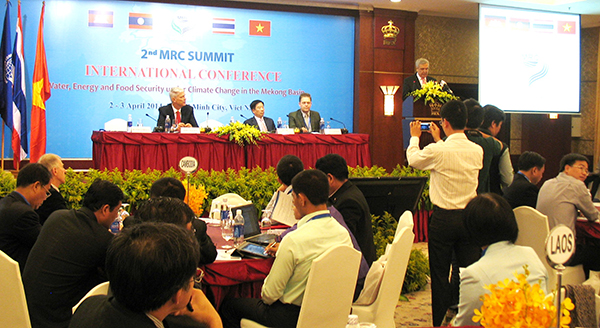Energy, food, water the focus of Mekong Summit

The two-day Pre-Summit conference outlined key topics and issues, focus areas and interests as well as desired outputs, aimed at informing potential participants and guiding speakers and panellists.
These topics are being widely addressed at the international level. Firstly, 2014 is the United Nations’ year on water and energy. This includes the publication of the World Water Development Report, with a specific focus on water and energy, and World Water Week in Stockholm to address questions related to water and energy. In 2015, assessing accomplishments of Millennium Development Goals is on the agenda as well as adopting a new set of Sustainable Development Goals to succeed these, thus setting the stage for the post-2015 development agenda.
Next year will also be the COP21 (21st Conference of the Parties on Climate Change) in Paris, at which a new global climate agreement is on the agenda. These topics are of great importance to organisations in trans-boundary and their efforts to manage water resources.
As a result, the MRC is targeting engagement between shared basins in sustainability discussions and management and development that benefits the Mekong basin and its population, said MRC Secretariat CEO Hans Guttman.
The conference has gathered some 300 participants, including chief and senior representatives from some 20 trans-boundary river basin organisations in Asia, Africa, Europe and the Americas. Also attending are leading representatives of some 15 international and regional organisations, most of whom are supporting the conference as sponsoring partners and serving as stakeholders in the Mekong region and beyond.
The conference is part of the Mekong Summit planned for April 5 that will seek political momentum from the four national leaders of the four MRC member states – Cambodia, Laos, Thailand and Vietnam – toward working together to overcome obstacles to sustainable development of the Mekong River basin.
Summit attendees include the prime ministers of Vietnam, Lao and Cambodia and Thailand. Others include ministers and senior government officials from the aforementioned countries.
What the stars mean:
★ Poor ★ ★ Promising ★★★ Good ★★★★ Very good ★★★★★ Exceptional
Latest News
More News
- Vietnamese businesses diversify amid global trade shifts (February 03, 2026 | 17:18)
- Consumer finance sector posts sharp profit growth (February 03, 2026 | 13:05)
- Vietnam and US to launch sixth trade negotiation round (January 30, 2026 | 15:19)
- NAB Innovation Centre underscores Vietnam’s appeal for tech investment (January 30, 2026 | 11:16)
- Vietnam moves towards market-based fuel management with E10 rollout (January 30, 2026 | 11:10)
- Vietnam startup funding enters a period of capital reset (January 30, 2026 | 11:06)
- Vietnam strengthens public debt management with World Bank and IMF (January 30, 2026 | 11:00)
- PM inspects APEC 2027 project progress in An Giang province (January 29, 2026 | 09:00)
- Vietnam among the world’s top 15 trading nations (January 28, 2026 | 17:12)
- Vietnam accelerates preparations for arbitration centre linked to new financial hub (January 28, 2026 | 17:09)
















 Mobile Version
Mobile Version